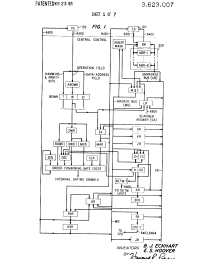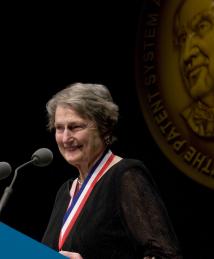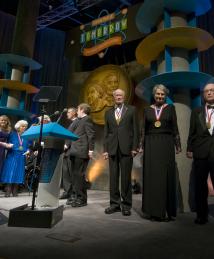Erna Schneider Hoover
Erna Schneider Hoover invented a computerized telephone switching system, changing how calls are connected. A key contribution to the system architecture of the first electronic telephone central office developed by Bell Labs, Hoover’s stored program control (SPC) system achieved an unprecedented level of flexibility and advanced modern communications.
Born in Irvington, New Jersey, in 1926, she and her two younger siblings were raised by their mother, a teacher, and their father, a dentist. Hoover took an interest in science at an early age, and she was particularly inspired by reading Marie Curie’s biography. Curie’s story taught her that women could reach any goal they set for themselves, despite the prevailing gender roles of the time.
In 1948, Hoover earned a bachelor’s degree in medieval history from Wellesley College, and in 1951, she graduated from Yale University with a doctorate in philosophy and foundations of mathematics – a level of study in which, at the time, only 5% of graduates were women.
Following her graduation, Hoover became a professor at Swarthmore College, where she taught philosophy and logic until 1953. In 1954, she accepted a research position at Bell Labs. At the time, the company intended to replace its hard-wired, mechanical telephone switching system and had begun exploring the development of electronic switch systems (ESS) to process calls more efficiently during times of increased telephone traffic. To help accomplish this, Hoover began working toward developing SPC system software that would process calls as they took place.
Hoover was in a hospital maternity ward after giving birth to her second daughter when she began sketching her plans for a transformative new telephone switching system. Continuing to work both in the hospital and at home, she created a program that would monitor the frequency of incoming calls and automatically adjust the acceptance rate, resulting in more robust service during peak call times and eliminating the possibility of system overloads.
“I designed the executive program for handling situations when there were too many calls, to keep it operating efficiently without hanging up on itself,” she said. “Basically, it was designed to keep the machine from throwing up its hands and going berserk.”
In 1957, Hoover entered the Bell Labs internal training program, now considered the equivalent of earning a master’s degree in computer science. She then joined a team working on the No. 1 ESS computer – the first large-scale ESS. Hoover wrote the specifications for this computer and its operating system. Her innovative work led to a promotion, as Hoover became the first woman to serve as supervisor of a technical department at Bell Labs.
The first SPC system went into service for a private business in 1963, and by 1965, SPC systems were in service in the public network with the No. 1 ESS. Today, all SPC systems are based on Hoover’s trailblazing designs, and they are used in a wide range of applications, from cellphone services to the internet.
In 1972, Hoover patented her computerized telephone switching system, earning one of the first patents ever granted for software. In 1978, she achieved another first as she was promoted to technical department head and became the first woman to reach this rank at Bell Labs. She managed several groups of programmers developing the U.S. Anti-Ballistic Missile system known as the Safeguard Program, and she worked on software applications with a focus on artificial intelligence and IMS-IBM/Unix-based system communications. After 32 years at Bell Labs, Hoover retired in 1987.
An advocate for accessible, quality education, Hoover joined the New Jersey Board of Higher Education in 1983 and served as a chairperson of the Trenton State College Board of Trustees, now called the College of New Jersey. Known as a “tenacious, energetic leader,” Hoover has been credited with leading the college’s progress in more equitably supporting women faculty and staff. In 2020, Hoover was awarded an honorary degree, Doctor of Humane Letters, for her contributions to higher education in New Jersey.
For her revolutionary work in advancing interconnected communication systems, Hoover has earned honors including the Wellesley College Alumni Award in 1990 and the National Center for Women’s Information and Technology Pioneer Award in 2023.


